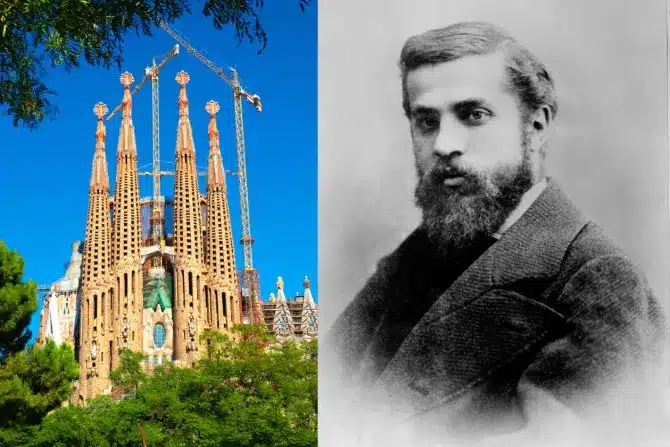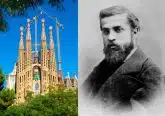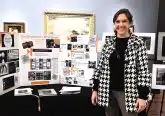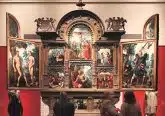Canonization cause advances for ‘God’s architect,’ Antoni Gaudí
Washington, D.C. Newsroom, Dec 5, 2023 / 11:21 am
The beatification cause for Antoni Gaudí, the Catalan architect known as “God’s architect” and designer of the Sagrada Familia Basilica in Barcelona, Spain, just completed an important step on the path to officially declaring him a saint in the Catholic Church.
Gaudí’s cause for beatification has been transferred from a civil association to an ecclesial association and has entered its “final process,” according to the Archdiocese of Barcelona. This means that he may soon be elevated to the status of “venerable,” the precursor to the status of blessed and saint.
The Archdiocese of Barcelona has submitted what is known as the “positio super vita, virtutibus, et fama sanctitatis” (position on the life, virtues, and reputation of holiness), which it said is the fundamental argument in favor of Gaudí’s beatification. The positio was sent to the Vatican’s Dicastery for the Causes of Saints, the archdiocese revealed in a Dec. 4 statement.
According to the archdiocese, this puts the cause in its “final process towards beatification.”
The dicastery will now decide whether to further advance the cause of the Catalan architect who is currently considered a “servant of God.”
If the dicastery approves, it will present the positio to the pope, who would then authorize its publication, allowing Gaudí to be called “venerable.”
Though the Church’s canonization process is lengthy and Gaudí’s cause has been open for decades, CNA reported in 2015 that Pope Francis expressed a desire to move the cause forward. In a 2015 meeting with the Association for the Beatification of Antoni Gaudí, Francis called Gaudí “a great mystic,” according to a CNA interview with Jose Manuel Almuzara, head of the association.
The group of primarily lay Catholics first began investigating the possibility of Gaudí’s sainthood in 1992. The cause for his canonization was then officially opened by the Vatican in 2003.
Cardinal Juan José Omella of Barcelona on Dec. 4 further signaled the archdiocese’s support for Gaudí’s canonization cause by transferring the case to a canonical association that will handle the cause from now on. The canonical association consists of Omella as well as several priests and lay faithful.
Gaudí, who died in 1926 at the age of 73, was a modernist and naturalist architect best known for the massive Sagrada Familia Basilica that towers over the city of Barcelona.
Though designed by Gaudí, the church has been under construction for more than 100 years. Its multitude of towering spires and unique architecture have made it one of the most renowned churches in the world.
The church is an active basilica and was dedicated by Pope Benedict XVI in 2010, 128 years after construction first began. During the dedication, Benedict said that by uniting nature, sacred Scripture, and the liturgy, Gaudí “brilliantly helped to build our human consciousness, anchored in the world yet open to God, enlightened and sanctified by Christ.”
Gaudí is also known for a wide array of truly unconventional but impressive works, including buildings, palaces, and monuments.
Though not known as a practicing Catholic in his earlier years, Gaudí is said to have had a conversion of heart after he began working on the Sagrada Familia. As the work on the basilica progressed, Gaudí became known for his fasting, asceticism, and devotion to God.
In the decades after starting his work on the Sagrada Familia, Gaudí increasingly devoted himself to prayer and the sacraments along with his work on the basilica.
He was on the way to his daily confession when he was hit by a tram, the accident that resulted in his death three days later.
Nora Heimann, a professor of art history at The Catholic University of America, told CNA that Gaudí’s canonization would bring many architects and artists joy to see one of the most renowned architects included in the canon of saints.
She likened Gaudí to other renowned Catholic artists throughout history such as Michelangelo and Vincent van Gogh, whose faith journeys were complex but whose work was deeply inspired by their Christianity nonetheless.
“These are artists that are really deeply informed by their faith, and the act of creation becomes an expression in certain ways of their spiritual journey,” Heimann said. “Their life’s work as artists is a part of their faith journey. That’s really a part of what they’re working out, is where is God in the world? Where is God in our lives? Where is the transcendent?”
According to Heimann, Gaudí’s works evidence his search for God. For all who view his works, they bring out the longing for beauty and transcendence, she said.
“Faith doesn’t lie flat on the page. It gets up and moves,” Heimann continued. “God is the best artist of all, and I think artists like Gaudí that look to nature to find that beauty and then try and capture that beauty themselves in a completely innovative way. Even if you’re not religious, you feel a kind of sense of transcendence.”














